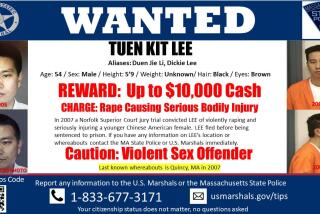Coco Lee Hits the Ground Running
For the past year, the scribes who would be Nostradamus in the media have strained their collective brain cell to figure out who the next Ricky Martin would be. Enrique Iglesias? Marc Anthony?
Little did we know that the Epic Records Group was several steps ahead of the herd, mining for the next great âcrossoverâ superstar, and finding her--in Hong Kong. Thatâs right. The next Ricky Martin sings in Cantonese and Mandarin and English, and sheâs definitely not a dude.
Her name is Coco Lee. Sheâs 23 and, like Martin, sheâs a multilingual, bicultural American who has sold millions of albums in a language other than English and is eager to make her mark in a mainstream U.S. pop world.
Leeâs first all-English album, the R&B-flavored; âJust No Other Way,â comes out on Epicâs 550 Music label Feb. 29, and is being marketed cautiously in an effort to protect Lee from being seen as a novelty act, which often leads to public burnout. If all goes well, Lee would become the first Asian American to break the Top 40 since Yvonne Elliman hit No. 1 with âIf I Canât Have Youâ in 1978, and would be the first pop star to make it big in Asia before breaking the U.S. market.
*
Leeâs new single, âDo You Want My Love,â was released to âdanceâ radio last month to build a grass-roots following. On Feb. 8, the single hit ârhythmâ radio stations, and on Tuesday it hits Top 40 radio. The usual route for pop albums is for the single to be available far in advance of the album.
The new album has been available in Asia since Oct. 30, and has sold half a million copies in Hong Kong, Taiwan, Singapore, Korea, Malaysia and Thailand. Lee has released a total of 20 albums in Asia during her five-year career, with 7.5 million albums sold.
âItâs kind of weird,â Lee says as she picks at French fries at an In-N-Out Burger near her Beverly Hills mansion. âItâs like Iâm starting all over again, even though Iâm already a star in Asia.â No one bothers her in the restaurant--an impossibility in Hong Kong or Taiwan, she notes with a grin. Her manager mentions a Shanghai album-signing that drew 15,000 fans recently. Lee shrugs and smiles and takes a bite of cheeseburger. âOh well,â she says. âEveryone has to start somewhere.â
Lee was born in Hong Kong and moved to San Francisco when she was 8, with her mother, a surgeon, and two older sisters. Leeâs father died before she was born.
Lee was told she might have to repeat a grade because she did not speak English. Lee learned English in two months and was the top pupil in school within a year. The over-achievement didnât end there. She was crowned Miss Junior Chinatown in middle school, and was class president in high school.
Lee got her start as a singer at 17, after wrecking her momâs car. To pay for the damage, she entered a karaoke singing contest, and won. Lee enjoyed the contest enough to enter a second time, and won again.
Hong Kong Talent Show Led to Record Deal
A year later, Lee graduated high school and flew to Hong Kong for the summer. There, she submitted an application to be on âNew Talent Search,â a popular television show similar to âStar Search,â seen throughout Hong Kong and mainland China. She was one of 10,000 applicants, and came in second in the final round.
âThey told me I tied with the person who got first,â Lee says. âBut they put me in second because I sang in English.â Sheâd sung Whitney Houstonâs âRun to You.â
The following day, Lee says, she was approached by record executives from Capitol Recordsâ Hong Kong office, with a record deal offer. Lee took it, but did not alter her plans to attend UC Irvine in the fall.
For a year, she struggled to juggle her academic career in the States with her singing career in Hong Kong. Eventually, she says, her college advisor took her aside and pointed out to her that people go to college in order to find a career, and that she obviously already had one.
Lee plans to return to college in the future, with hopes of getting a medical degree and going into cancer research.
Lee grew up listening to singers such as Houston and Mariah Carey, but found it very challenging to transpose the feel of R&B; into Cantonese. Cantonese, she explains, is a tonal language--meaning that the same word can have up to seven meanings, depending on the pitch at which it is pronounced.
Because of this, the licks and riffs employed by R&B; singers in English are impossible in Cantonese, because changing the pitch of a word also changes its meaning.
To get around Cantonese language restrictions, Lee taught herself Mandarin, which has more tonal flexibility. Her Americanized take on Asian pop was embraced throughout Asia, and she became a superstar there.
Lee, who has homes in Beverly Hills, Irvine, Hong Kong and Taiwan, says she dislikes makeup or fancy clothes, and that the âreal Cocoâ is apt to wear sweats and play basketball.
Some Asian American Stereotypes Persist
Though Lee says she has never encountered racial or ethnic discrimination in the music business, her manager, Jason Morey, does not agree. Morey says the music industry here is infected with ridiculous stereotypes about Asians and Asian Americans. âI see it every day,â he says. âI say I have a great singer whoâs gorgeous and theyâre interested until I say sheâs Chinese and their eyes just glaze over.â
Morey says the perception remains that Asian Americans are foreigners who wonât appeal to pop audiences. âCocoâs already changing all that,â he adds.
Lee listens to Morey and nods. âI guess itâs not that I havenât encountered it as much as I donât let it hold me back. I love to prove people wrong. They expect Iâll sound a certain way when they see me, then they hear me and they canât believe it. I love that.â
More to Read
The biggest entertainment stories
Get our big stories about Hollywood, film, television, music, arts, culture and more right in your inbox as soon as they publish.
You may occasionally receive promotional content from the Los Angeles Times.









